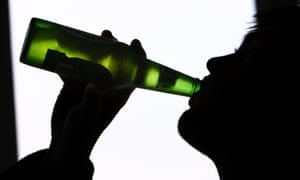 “Poison, everyone?” “Of course, keep it coming” Photograph: Paul Harding/PA
“Poison, everyone?” “Of course, keep it coming” Photograph: Paul Harding/PAIf someone offered you a glass of mild poison, you’d decline. If they said “drink this, it’ll make it harder to walk, speak and remember things, and you’ll feel awful tomorrow”, you’d be even less keen. If they expected payment for it, you might even get annoyed at their audacity. You certainly wouldn’t be grateful for it, then buy yourself and them several more doses over the course of an evening. Nonetheless, this happens all the time.
Alcohol does all the things described above and more. Nonetheless, many people don’t let that put them off. With the festive season kicking off, alcohol consumption goes up. The parties (work and otherwise), time-off, social visits, the breakfast champagne, and so on. All these “festive tipples” add up to an increase in our intake of something that, if the dose is high enough, counts as a toxin.
Admittedly, that’s a misleading statement. Via that logic, anything can count as a toxin (e.g. oxygen). However, the effects of alcohol are far more potent at lower doses. Nobody ever tells us not to breathe and drive.
The unpleasant biological/neurological effects of alcohol are well known, but as a society we’ve clearly decided (for the most part) that these down-sides are “worth it”. Sure, alcohol makes us feel wretched the next day, but at the time it’s great!
Why? Ignoring long-term results like supposed health benefits (still a hotly debated subject), what positives do we get from alcohol that overrules all the negatives?
The mechanisms of alcohol intoxication are quite confusing. We’re talking about a relatively small molecule (ethanol) that ends up present throughout the whole brain. Ethanol disrupts the cell membranes of neurons, mildly and temporarily, but neurons are complex and delicate, so this still affects their functioning. Given that all the brain’s functions depend on neurons, alcohol potentially affects the entire brain, all at once. You can see why it would be tricky to pin down the exact causes of drunken antics.

“I’m never drinking again” may be the most commonly broken promise in history. Photograph: David Jones/PA
Luckily, science doesn’t shy away from a challenge, so we do know a bit more these days. Ethanol interferes with the actions of various neurotransmitters, the chemicals neurons use to send signals to each other. It inhibits the action of glutamate, the main “excitatory” transmitter (i.e. it turns things on, increases their activity). It also amplifies effects of GABA, the most potent “inhibitory” neurotransmitter (i.e. it lowers/prevents activity in target areas, like a light switch or volume knob), specifically via a certain type of GABA receptors. Drugs like Valium work in the same way, hence you’re told to avoid alcohol while taking them; it’s increasing the effects of an already potent drug.
What’s this all mean? While it’s true that alcohol acts as a “depressant”, the varied and widespread effects on the brain means it’s not so straightforward. Alcohol may depress activity in one area of the brain, but that may connect to another area, specifically to stop it activating, ergo alcohol is indirectly increasing activity by depressing something. The workings of the brain are confusing enough while sober, in fairness.
Some of the more “classic” effects seem based around this depressant effect. Alcohol suppresses activity in the prefrontal cortex and temporal lobes. The prefrontal cortex is responsible for rational thought, planning, assessment, anger suppression, all the complex things that go out the window after the 6th pint. The temporal lobes are where memory processing regions are located, and we know how alcohol affects memory (well, most of the time). This would explain why we become more incoherent and forgetful, and less restrained, while inebriated.
This doesn’t explain why we enjoy alcohol though. That aspect seems to stem from the fact that alcohol increases activity in the dopamine neurons in the mesolimbic reward pathway, as well as opioid cells that release endorphins. Both produce feelings of joy, pleasure, euphoria, depending on the type of activation. That’s why drinking can be so pleasurable. At least at first.
It’s a familiar sight. Or experience. At the start of a night out, after the first drink or two, everyone’s relaxed, laughing, getting on swimmingly, a lot of fun is had. You’re around others you approve of, inhibitions are lowered, the parts of your brain that worry about stress and unpleasantness are suppressed, so everyone’s happy and interacting nicely. Coupled with the euphoric effects of alcohol, why wouldn’t you keep drinking?
Then, after a certain point, things change. People slump over, suddenly fatigued. Speech is hard. Fights flare up over nothing. Someone’s sitting on a step crying over some possibly-imagined slight. The atmosphere is now a lot bleaker.
“I’ve lost my phone, thrown up in strange man’s hat, and I’ve no idea where I am or where I’m going”
“Same time next week?”
“Absolutely” Photograph: Matt Cardy/Getty Images
Obviously there are many possible variables that contribute to this, but one important thing to remember is that alcohol has a “biphasic” effect. Put simply, alcohol makes you feel both better and worse, but these effects occur at different levels of intoxication. According to evidence, the euphoric effects of alcohol peak at around a blood alcohol level of 0.05-0.06%. After this point, the positive effects of alcohol diminish while the negative effects increase, darkening your mood, impairing your faculties and sapping all your energy.
Advertisement
The myth is that you should “drink through it”, but science doesn’t back this up. It suggests there literally is a “sweet spot” where you’re drunk enough, but not too drunk. If you can maintain this level, maybe you’d have a better time of it?
It’s very difficult though, alcohol effects and tolerance vary massively from person to person so determining your own thresholds subjectively is very difficult. That’s even if your rational thinking wasn’t hampered. Which, as we’ve established if you’re drinking, it is. And subjectively, it’s also quite counterintuitive. “This stuff I’ve been consuming that induces pleasure, well it’s not changed at all but it now makes you feel wretched”. That doesn’t happen often, it’s like a delicious cake suddenly being laced with sour milk and bin juice when you’re half way through eating it.
And that’s without the social pressure. Alcohol is a big element of our social interactions (in the UK at least) so not drinking, or stopping drinking, is normally met with criticism or mockery, which we want to avoid, even at a subconscious level. It can be extremely powerful, this social influence. If you’re allergic to alcohol, you’ve likely been pressured to have a drink anyway because “just one won’t hurt”, when it literally will. Clearly.
So as with most things linked to the brain, drinking alcohol is a lot more complex than it may seem. But there’s one positive; some studies suggest that an awareness of low-level intoxication can actually improve performance at tasks,because individuals know they’re compromised so consciously become more alert and attentive than normal to compensate. This suggests that Mitchell and Webb’s “Inebriati” sketch is scientifically valid.
So, next time you’re advised to “drink responsibly”, at least now you have an idea of how to do that. Good luck.
Dean Burnett was at a stag party last weekend, as it happens. His book The Idiot Brain, is available now in the UK, USA, Canada and many other countries.
Some of the more “classic” effects seem based around this depressant effect. Alcohol suppresses activity in the prefrontal cortex and temporal lobes. The prefrontal cortex is responsible for rational thought, planning, assessment, anger suppression, all the complex things that go out the window after the 6th pint. The temporal lobes are where memory processing regions are located, and we know how alcohol affects memory (well, most of the time). This would explain why we become more incoherent and forgetful, and less restrained, while inebriated.
This doesn’t explain why we enjoy alcohol though. That aspect seems to stem from the fact that alcohol increases activity in the dopamine neurons in the mesolimbic reward pathway, as well as opioid cells that release endorphins. Both produce feelings of joy, pleasure, euphoria, depending on the type of activation. That’s why drinking can be so pleasurable. At least at first.
It’s a familiar sight. Or experience. At the start of a night out, after the first drink or two, everyone’s relaxed, laughing, getting on swimmingly, a lot of fun is had. You’re around others you approve of, inhibitions are lowered, the parts of your brain that worry about stress and unpleasantness are suppressed, so everyone’s happy and interacting nicely. Coupled with the euphoric effects of alcohol, why wouldn’t you keep drinking?
Then, after a certain point, things change. People slump over, suddenly fatigued. Speech is hard. Fights flare up over nothing. Someone’s sitting on a step crying over some possibly-imagined slight. The atmosphere is now a lot bleaker.

“I’ve lost my phone, thrown up in strange man’s hat, and I’ve no idea where I am or where I’m going”
“Same time next week?”
“Absolutely” Photograph: Matt Cardy/Getty Images
Obviously there are many possible variables that contribute to this, but one important thing to remember is that alcohol has a “biphasic” effect. Put simply, alcohol makes you feel both better and worse, but these effects occur at different levels of intoxication. According to evidence, the euphoric effects of alcohol peak at around a blood alcohol level of 0.05-0.06%. After this point, the positive effects of alcohol diminish while the negative effects increase, darkening your mood, impairing your faculties and sapping all your energy.
Advertisement
The myth is that you should “drink through it”, but science doesn’t back this up. It suggests there literally is a “sweet spot” where you’re drunk enough, but not too drunk. If you can maintain this level, maybe you’d have a better time of it?
It’s very difficult though, alcohol effects and tolerance vary massively from person to person so determining your own thresholds subjectively is very difficult. That’s even if your rational thinking wasn’t hampered. Which, as we’ve established if you’re drinking, it is. And subjectively, it’s also quite counterintuitive. “This stuff I’ve been consuming that induces pleasure, well it’s not changed at all but it now makes you feel wretched”. That doesn’t happen often, it’s like a delicious cake suddenly being laced with sour milk and bin juice when you’re half way through eating it.
And that’s without the social pressure. Alcohol is a big element of our social interactions (in the UK at least) so not drinking, or stopping drinking, is normally met with criticism or mockery, which we want to avoid, even at a subconscious level. It can be extremely powerful, this social influence. If you’re allergic to alcohol, you’ve likely been pressured to have a drink anyway because “just one won’t hurt”, when it literally will. Clearly.
So as with most things linked to the brain, drinking alcohol is a lot more complex than it may seem. But there’s one positive; some studies suggest that an awareness of low-level intoxication can actually improve performance at tasks,because individuals know they’re compromised so consciously become more alert and attentive than normal to compensate. This suggests that Mitchell and Webb’s “Inebriati” sketch is scientifically valid.
So, next time you’re advised to “drink responsibly”, at least now you have an idea of how to do that. Good luck.
Dean Burnett was at a stag party last weekend, as it happens. His book The Idiot Brain, is available now in the UK, USA, Canada and many other countries.
.jpg)
No comments:
Post a Comment
Please Leave Your Comment Here